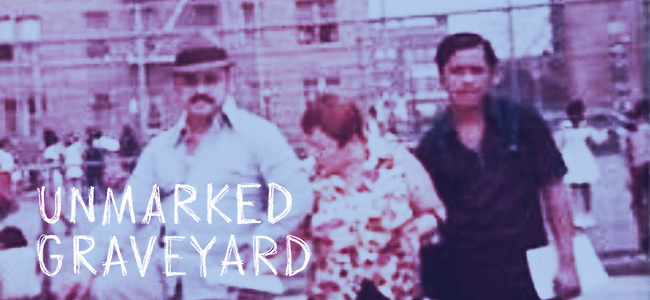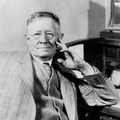Joe Richman [host]: Two years ago, a former detective named Angel Irizarry set out on a personal investigation to track down an uncle who had been out of touch with the family for decades. But early in his search, he made a disappointing discovery. His uncle, Caesar, had died.
From Radio Diaries, I’m Joe Richman and this is The Unmarked Graveyard. A series of untangling mysteries from America’s largest public cemetery. Each week we’re bringing you stories about people buried on Hart Island, the lives they lived and the people they left behind.
[montage of clips from the series]
Today, episode six. The story of Angel Irizarry and his long lost uncle, Caesar.
Angel Irizarry: Alright, this is um, Angel Irizarry. I just received the death certificate of my Uncle Cesar.
[sound of opening envelope]
It says the date of death was July 19th, 2020. Which would have made Uncle Cesar 64 years old. And it says place of disposition is City Cemetery at Hart Island. Everything else pretty much says unknown. The usual occupation unknown, kind of business unknown, says mother and parents are unknown, but the truth of the matter is he does have family and he did have family.
Uncle Cesar was estranged from our family, I would say about 40 to 50 years. I’m 45 years old and I only seen him one time. I think I was probably about six or seven sitting on the floor playing with toys at my grandparents house. And then there was this tall, dark gentleman standing at the door. I looked and was like, who the heck are you?
You know, you look like my dad, close to a spitting image. And I have never seen you before. I think I went to my dad and was like, you know, who is this guy? My dad was like, that’s your uncle Caesar. But after that, I never seen him again.
From that point forward, I was asking questions like, well, where is he? How come I don’t see this guy? My aunts and even my grandparents wouldn’t want to speak a word of who Uncle Cesar was. There would be times that I would go through some pictures and I would ask, Hey, who’s this guy? And people would say, that’s nobody.
My father did finally sit me down and told me that when Uncle Cesar was about 21, 22, he was hanging out with a very bad crowd who used to drink a lot. One day he came to the house asking my grandfather for money. And my grandfather was very mad at him because he was drunk. And uncle Caesar punched my grandfather.
And then my grandfather told him that he was banished from the family forever.
It’s sad, man. He was isolated from the family, so I know that’s sad, man. I know it’s sad for me. I start, you know, relating to him more as a teenager to the point that I was like, Well, I can see how people get banished because I feel like that’s kind of like what’s happening to me a little bit. I was getting into some, I don’t want to incriminate myself, but I was getting into some things that have to do with gangs, drugs, alcohol, to the point that I got kicked out of my house.
But I became the man that I am now because of my father and the family who stood by my side and I believe that Uncle Caesar, he was a man who needed to be forgiven just like I need to be forgiven. I always knew that he was out there and always. Wanted more of a relationship with him. And now that he’s gone, I started looking to see if anyone knew him.
Someone who can give me a little bit of insight on how he died, but also how he lived.
[sound of car doors opening and closing]
Irizarry: Okay, so, um, today, me and my wife, we just drove from Virginia to the Bronx, New York. We’re going to the last place where Caesar lived before he passed, we were able to locate his roommate, who he lived with.
[knocking sound, door opening, man’s voice speaking spanish]
Irizarry: Hi. Nice to meet you. My Spanish not so good, so, oh, uh, he’s going to speak for me.
William Calderon: Okay.
Irizarry: So I am the nephew of Caesar Irizarry.
Calderon: [man speaking Spanish and English translator] My name is William Calderon. I lived with Cesar I think 5, 6, 7 years. I can start from the beginning if you want.
Irizarry: Uh, yeah, definitely. How did you come to meet him?
Calderon: Yeah, my mom and I, we rent out rooms, uh, so we can make rent, and he came and rented out a small room, but then, uh, due to his drinking, we started to have some issues and he decided himself to go to rehab. That time, he lasted about a year, almost a year without drinking, but then he started drinking again. But he started to calm down over time and we started to have a really good relationship.
Irizarry: Would you consider him a good man?
Calderon: Of course, great person. The only thing is that when he started drinking, he would become someone else. But you know, he was good to me and my mom. And he would pay his rent first day of the month when he would get his check from the government.
Irizarry: Why did the government take care of him? He wasn’t working?
Calderon: No, he did not work. We would talk, we would chat. He would talk to me about his family. He would say that he had a family, but he wasn’t in touch with any of them. And he would say he felt bad for not being what his family wanted him to be. And he said he knew he was the one who messed up with his family and he was the one that strayed away.
That’s actually why he would call his dad and his dad would get annoyed because he’d be drunk when he called.
Irizarry: You know. If Caesar contacted my grandfather and he was drunk, that type of situation brings back the past.
Calderon: He would tell us precisely that. I’m laughing. Um, it’s not funny, but I’m laughing because that’s exactly what he would tell us. That his dad hated when he called him while he was drunk.
Irizarry: Did he pass away in this house? Do you know when he passed?
Calderon: I remember it like it was today. It was July 4th, and he went out as usual to drink.
And then from the park, they called the ambulance because he couldn’t stand up or walk or handle himself. When I got the call from the hospital, I was told his organs started failing and that he could stop breathing at any moment. They asked me if I wanted to say anything to him over the phone. And I told him, Cesar, remember there’s a God and that I’m with you.
And I couldn’t continue speaking with him because I started tearing up and I couldn’t say anything else. But the doctor said, uh, rest assured that he heard you because he moved his hand when you were speaking.
Irizarry: That’s beautiful, man. That’s beautiful. This. Whole. The situation really shows you that time is short and you don’t have time to hold grudges.
Calderon: Let me tell you something that might give you some peace. He wasn’t with his own family, but I can tell you that he was loved. While he lived here, he had that love of a family. He would even tell us, my mom and I, you’re my family.
Irizarry: So that makes me feel more happy than anything. And um, thank you for being his friend. It really goes and shows that it doesn’t have to be blood to be family.
Calderon: Amen. Amen.
When he passed away, uh, they called me from the hospital asking what should I do with his body. And I told them that he himself, while he was alive, told me for the government to take care of it. I don’t even know where they buried him.
[sounds of boat and nature]
Irizarry: Test 1 2, 1 2. We are here at the beginning of the ferry to go to Hart Island. And, uh, at this time we’re going to go see the gravesite of Uncle Cesar.
He’s more alive to me now. He’s more alive to me now because… I walked in a place where he walked. I talked to the people he talked to. Oh, this is it. And I wanted to speak with him, but I’ll go. Caesar. We’re here. I wish I could have. Known you more, wish I could have spent time with you and, um, I’m sorry for that, but I never forgot about you and everything that we have done as a family against you, we ask for forgiveness and everything that you have done against us.
We forgive you until we meet again. I’ll go Cesar. God bless you. [Spanish] in Jesus name. Amen.
Joe Richman [host]: That was Angel Irizarry remembering his uncle Caesar. Our story was produced by Alissa Escarce. Daniel Gross and Tyler Brady. It was edited by Deborah George, Ben Shapiro, and me. Our interpreter was Ramon Mendez. Sound mixing by Mitra Kaboli. The Radio Diaries team also includes Nellie Gilles, Mycah Hazel, and Lena Engelstein.
This story was reported in collaboration with the Missing Them Project from the non-profit news site The City. Thanks to editor Anjali Tsui. Missing Them is supported in part by the Brown Institute for Media Innovation at Columbia University. And thanks to our broadcast partner NPR’s All Things Considered.
We’re proud members of Radiotopia from PRX, a network of independent, creator owned, listener supported podcasts. You can hear them all at radiotopia. fm. Radio Diaries has support from the National Endowment for the Humanities, the Lily Auchincloss Foundation, New York City’s Department of Cultural Affairs, and from listeners like you.
Coming up on the Unmarked Graveyard, the mystery of a woman who lived in a hotel room in midtown Manhattan.
Unidentified male voice: Hisako Hasegawa lived here for at least 40, 50 years, and she lived alone. You see such a person and you can’t help but wonder what her life has been.
Richman: I’m Joe Richman of Radio Diaries, see you next week.








